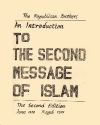The Second Message of Islam
We mentioned, in an earlier section on the Medinese and Meccan Quranic texts, that following the Prophets emigration from Mecca to Medina, the Meccan texts were repealed and the Medinese texts began to be revealed. The repealing of the Meccan texts did not mean that they were thrown away. In fact, the high moral precepts embodied in them, such as respect for the dignity of every human being as equals, care for others, love, etc ... all continued to be exemplified in the model set by the Prophet’s life, who adhered in his “private” life to the grand Meccan texts. Of course, the Prophet as a leader of his nation continued to depend on the Medinese texts as the main source of all legislation and the laws promulgated by him.
The above mentioned situation resulting from the adherence of the Prophet, in his “private” life, to the Meccan texts, on the one hand, and the use of the Medinese texts as the basis for all social, political and economic legislation on the other, meant that two quite different levels of Islam, a level adhered to by the Prophet and another adhered to by the nation at large, were then coexistent. The former level was, indubitably, far more humane and advanced than the latter. That level based on the Meccan texts and exemplified by the Prophet’s life represents what we have called the Second Message of Islam.
Since the Meccan texts were repealed, it should be very clear that the Islamic laws which, until now, have been governing Muslim communities were not based on those texts, but rather on the Medinese texts as mentioned earlier. So in order to apply the Second Message of Islam, it is necessary to consciously evolve the Islamic laws and legislation from the Medinese to the Meccan level. In this conscious evolution of Islamic laws we are going to be guided by the genuine spirit of Islam, embodied in the search for absolute individual freedom and demonstrated by the Prophet’s life; and we are also going to be guided by the needs of contemporary society summed up in the search for total social justice.
This concept of evolving Islamic laws from the Medinese to the Meccan level is a very radical and new concept, never stated before in the history of Islamic thought. Indeed this concept represents a real breakaway for the New Islam Mission, which preaches the Second Message of Islam, from all traditional thinking in Islam, because it implies the repealing of the Medinese texts which have, hitherto, been the basis of all existing laws and legislation, as well as their replacement by the Meccan texts as the main source of all new laws and legislation which are going to supersede the existing ones.
The concept of evolving Islamic laws from Medinese to the Meccan level has many serious repercussions in all planes, political, economic as well as social. But it may be sufficient, in this context, to point out that the main driving force behind this evolution of Islamic laws is the realization of equality in all aspects of life, so as to construct a good society where democracy and socialism are reconciled, and where social equality prevails.
Now, social equality, which is a direct outcome of the realization of economic and political equality, finds its expression in many important fields. But the most important manifestation of social equality is in relation to the question of emancipation of women and their equality with men before the law and in all aspects of life. Since this question, concerning women, has always been a source of many objections raised against Islam, it may be worthwhile to tackle this problem at some length in what follows, in order to show how the legal and social positions of women in the Second Message of Islam are improved and developed, by applying the Meccan texts - the fundamental texts - so as to meet the demands and needs of modern women which are in line with the spirit of Islam.

